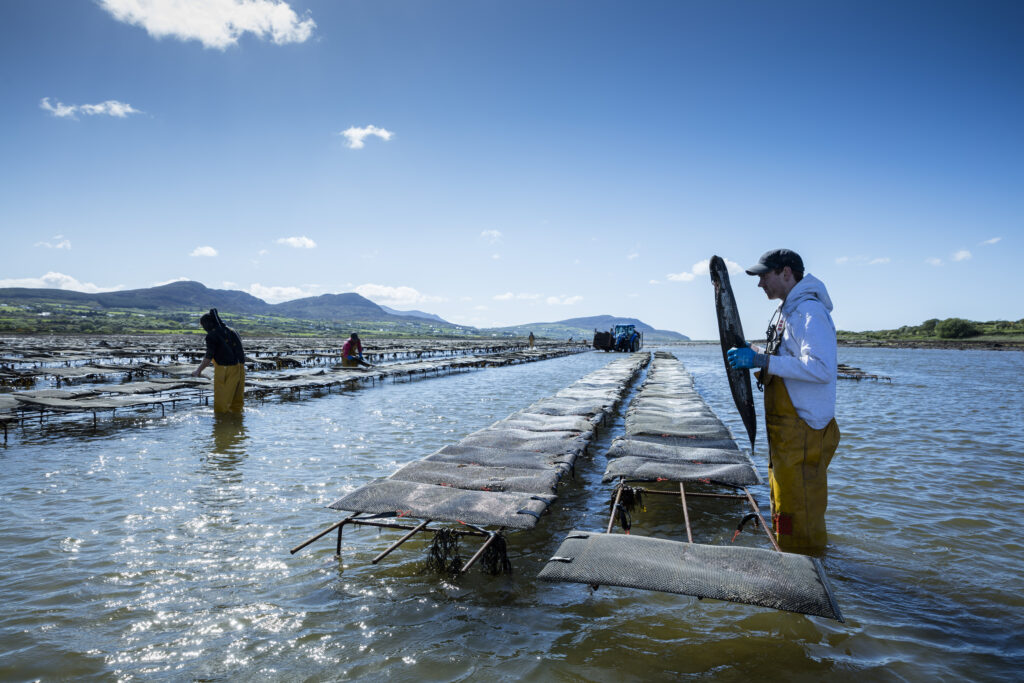
New entrants and those already employed in the seafood sector can apply for funding to train and upskill from seafood industry schemes administered by Bord Iascaigh Mhara (BIM), under the €258.4 million European Maritime Fisheries and Aquaculture Fund 2021-27 (EMFAF).
Young fishers will be supported to buy their first vessels and aquaculture operators will also receive funding to sustainably develop their businesses following the announcement of three EMFAF schemes by the Minister for Agriculture, Food and the Marine, Charlie McConalogue TD.
Welcoming the Minister’s announcement, BIM CEO Caroline Bocquel said the new EMFAF schemes were designed to develop an agile and professional workforce across the seafood sector, as well as a sustainable aquaculture industry.
“Minister McConalogue secured €258 million funding for the new EMFAF programme and BIM worked closely with his Department to develop seafood schemes that will meet industry needs,” Ms Bocquel said.
“BIM, along with Minister McConalogue and Government, are committed to attracting new talent and developing skills and knowledge of the existing workforce to secure the future of Ireland’s seafood industry.
“The Seafood Training Scheme is designed to attract new entrants to the sector, providing them with significant financial support to undertake training and build a fulfilling career.
“It also provides fantastic opportunities for those working in fishing, processing and aquaculture to learn new technical and business skills, helping the seafood industry to navigate challenges and setting it up for long term growth.
“For the first time, people applying for training will be automatically enrolled for grant aid, ensuring that all those who are eligible receive financial support.
“The grant aid for course fees and subsistence costs provides an incentive for workers to take time out for training, which will ultimately benefit them, their employer and the wider sector. Vessel owners can also plan around training courses so their crew are upskilling when they’re not at sea.”
The Seafood Training Scheme will help BIM deliver on its key strategic objectives outlined in the skills strategy, ‘The Next Wave 2023-2028’, which include attracting new entrants and creating and promoting career paths in the seafood sector. Minister McConalogue’s Department has provided €5 million over the lifetime of the strategy to achieve these objectives.
The Young Fishers scheme will provide grant aid for fishers aged under 40 to purchase their first second-hand vessel.
“The Young Fishers scheme will help young people working in fishing to buy their own vessel, helping them get a foothold in the industry” said Ms Bocquel.
“The cost of purchasing a vessel is significant, particularly for young people, and this new scheme will help them make this first critical investment.
“The support provided by Minister McConalogue’s Department through the Young Fishers Scheme will help build the next generation of fishers, ensuring the industry is well placed to modernise and adapt.
“As with all industries, it is important to attract a new talent and help them build meaningful, sustainable and rewarding careers.”
The Young Fishers Scheme supports the purchase of second-hand vessels that are already within the existing Irish fleet capacity – it will not support the introduction of any new vessels into the fleet.
“The Sustainable Aquaculture Scheme will support aquaculture businesses to make investments that boost sustainability including developing product innovation, energy efficiency measures, safety, animal health and welfare, and food quality,” added Ms Bocquel.
“The Irish aquaculture industry is experiencing strong growth with increased sales, generated value and sustained employment opportunities. In 2022, the sector contributed €208 million to the economy, supporting 2,000 jobs, and there is huge potential for future growth.”
The three schemes are:
Seafood Training Scheme – 100% support rate for owners of small scale coastal fishing (SSCF) vessels, for courses deemed relevant for SSCF vessels, and 50% for all other eligible applicants, and all other courses which SSCF vessel owners might choose to attend.
This scheme is open to new entrants to the Irish seafood sector, or currently employed within the sector and wish to upskill. Grants will be paid directly to the student undertaking training to allow them to claim subsistence payments to which they may be entitled.
Eligible expenditure includes:
Young Fishers Scheme – grant aid of up to €250,000 or 40% of the cost of vessel acquisition, proportionate to the applicant’s shareholding in the vessel.
Sustainable Aquaculture Scheme – 50% support rate for eligible aquaculture operators for investments including:
For more information on EMFAF schemes, including eligibility requirements and eligible expenditure, please visit www.bim.ie.
The media release from the Minister for Agriculture, Food and the Marine, Charlie McConalogue TD, is available here.